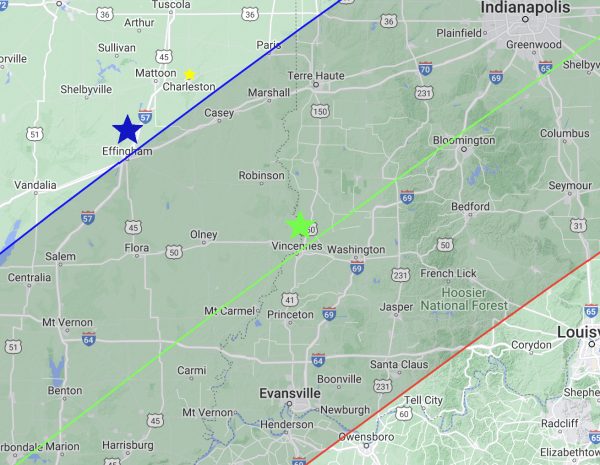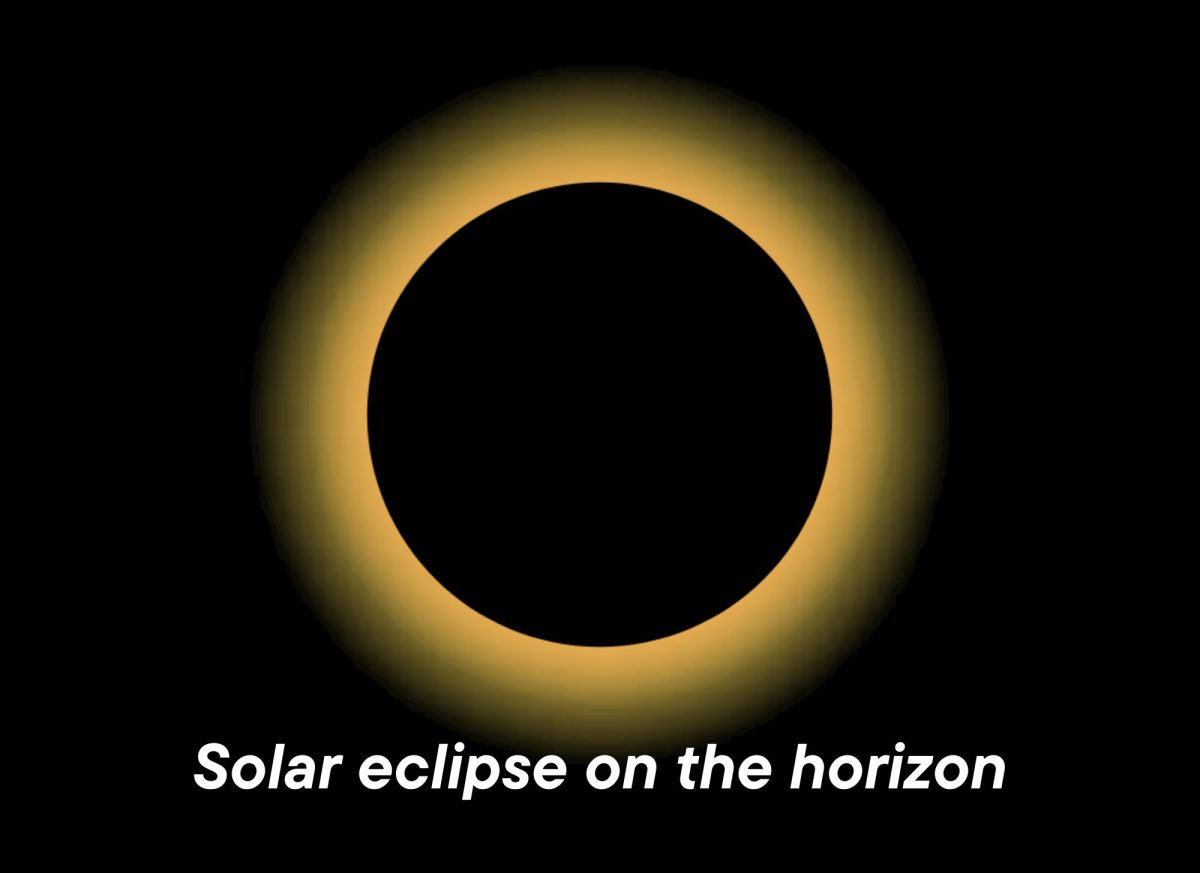As the clock ticks down to the total solar eclipse on April 8, the towns of Vincennes, Indiana, and Lawrenceville, Illinois, are bustling with excitement and preparation, said the director of the Vincennes eclipse, Sarah Wolfe.
Both towns are around an hour and a half south from Charleston set in the path of totality for the upcoming eclipse.
Charleston is not in the path of totality, so it will not see a total solar eclipse, but it is close. According to the city of Charleston website, the Lincoln Log Cabin will see a 99.99% partial eclipse. The rest of Charleston will see 99.87% partial eclipse.
Over 50,000 people are expected to attend the event between Lawrenceville and Vincennes, said Wolfe. Currently, Lawrenceville has a population of 4,209 while Vincennes has one of 16,484.
This rare event will not happen again for 129 more years in the area, according to timeanddate.com.
Vincennes began making plans right after the total eclipse that passed through Carbondale in 2017. From emergency personnel to small business owners, everyone is trying to prepare for the large influx of guests.
Pretty Posies, a home decor and souvenir shop located on Main Street in Vincennes has extended store hours for the weekend before the eclipse. The store will even open on Sunday for the first time ever, said the owner Jan Witteried.
“It was too risky to go with eclipse specific stuff, but I figured people traveling from a long way may want something that says Vincennes on it,” said Witteried.
All emergency personnel in Vincennes are required to work during the weekend before and the day of the eclipse, more specifically from the hours of 3 to 5 p.m., to help combat the traffic from thousands of people leaving right after the eclipse.
“Around that time is when we will implement those plans that involve changing traffic light patterns to sure that they work smoothly and consistently switching over to flashing yellow lights to keep people moving,” said Wolfe.
After the eclipse ended in Carbondale, the traffic was stopped for eight hours. Carbondale has more roads and larger roads than both Lawrenceville and Vincennes.

“If you have to go out that day, make sure you have a full tank of fuel, something to eat in the vehicle and warm clothes,” said the Lawrence County emergency management director, Joe Calvert.
During a total eclipse, the whole sky turns into nighttime colors, said Lawrenceville High School science teacher David Atkins. If the event happens on a clear, sunny day, stars will be visible. Insects and animals will get confused as well and begin to make evening noises.
Proper eyewear is necessary to look at an eclipse before totality. Even looking at the sun for a couple of seconds can cause permanent damage.
“In general, staring directly at the sun, even for a few seconds, can cause permanent damage to your eyes,” said Katrina Miller in a New York Times article. “This can range from blurry or distorted vision to something even more serious like blind spots. Because there are no pain receptors in the retina, you won’t feel it while it’s happening.”
During totality, however, it is safe to take off the specialized glasses and look directly at the sun. This will not cause harm to the eyes.
Both the Knox County and Lawrence County chambers of commerce will be handing out the specialized eclipse glasses to all students the week before the eclipse, stated Wolfe.
The path of totality is around 100 to 120 miles wide. Depending on how close people are to the center line of the path of totality, the longer total darkness takes place. Lawrenceville and Vincennes have one of the longest viewing times with four minutes and five seconds. Effingham, on the edge of the path of totality, will only have around 50 seconds of totality.
“I want people to know how special and important this is,” said Wolfe. “It’s really a wonderful reminder of how tiny we are as humans. I implore you to not miss it. Do everything you can to get to see this because it’s like nothing you will ever see again.”
Elsie Svika can be reached at 581-2812 or at ejsvika@eiu.edu.

















![[Thumbnail Edition] Senior Foward Macy McGlone, getsw the ball and gets the point during the first half of the game aginst Western Illinois University,, Eastern Illinois University Lost to Western Illinois University Thursday March 6 20205, 78-75 EIU lost making it the end of their season](https://www.dailyeasternnews.com/wp-content/uploads/2025/03/WBB_OVC_03_O-1-e1743361637111-1200x614.jpg)




















































![[Thumbnail] Eastern's Old Main was quiet Thursday morning while educators who had left the office to strike picketed outside.](https://www.dailyeasternnews.com/wp-content/uploads/2025/04/Strike_01_LT_O-800x1200.jpg)



